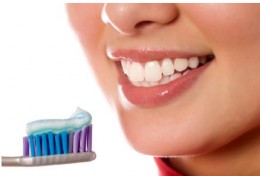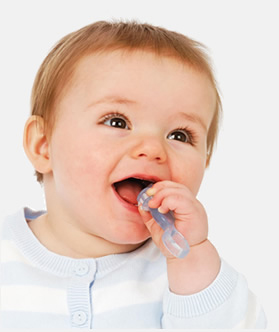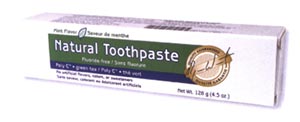How important is it for women to take care of their teeth during pregnancy?
 That’s a key thing because the more decay that you have in your mouth, the higher the bacteria count is that is associated with dental decay. What happens is they’re going to have their own problems, pain and needless dental work, extractions, things you don’t want to have to deal with while you’re pregnant. Then afterwards when they have their baby, they have this high bacteria count when the baby begins to get teeth. The thinking is, at least right now, once the teeth come in, this bacteria that’s associated with dental decay can adhere to the tooth structure, so the higher the bacteria count in the mom, when they blow on the child’s food or kiss them, can actually give them a higher percentage of that bacteria, making them more prone to decay. If they get decay early on, they’re going to be more prone for decay throughout the rest of their life. That’s a key thing.
That’s a key thing because the more decay that you have in your mouth, the higher the bacteria count is that is associated with dental decay. What happens is they’re going to have their own problems, pain and needless dental work, extractions, things you don’t want to have to deal with while you’re pregnant. Then afterwards when they have their baby, they have this high bacteria count when the baby begins to get teeth. The thinking is, at least right now, once the teeth come in, this bacteria that’s associated with dental decay can adhere to the tooth structure, so the higher the bacteria count in the mom, when they blow on the child’s food or kiss them, can actually give them a higher percentage of that bacteria, making them more prone to decay. If they get decay early on, they’re going to be more prone for decay throughout the rest of their life. That’s a key thing.
Genetically, is there any connection if a mom has problems that the child will automatically?
For the most part, a lot of people want to blame genetics and say, ‘I have soft teeth and my mom had soft teeth,’ and that kind of thing. Genetics plays a role. It’s a piece of the pie, but people tend to want to blame everything on genes, because you know people who never brush their teeth that never get a cavity. Some people are just the opposite. Still, it comes to mainly diet and how good they take care of their teeth is the biggest thing.
How soon after a child is born do you need to start thinking about the future of oral health care?
The American Academy of Pediatric Dentistry recommends a child see a dentist for their first visit when their first tooth erupts or at least by their 1st birthday. The Academy of Pediatrics’ official stance is go see the dentists at age 3, but they have a little footnote to that that says if appropriate, a child may need an earlier referral. But, you may call your family dentist and they may say, ‘wait until they’re 4 or 5.’ It is embarrassed to say this, but even the pediatric dentists will say children don’t have to come in until they have a problem. It’s generally the older dentists that may be close to retiring, maybe they think that way, but a lot of the younger dentists are trying to get them in earlier. The first visit to the dentist is really to figure out what this child’s risk for decay is. They may be at high risk because they’re going to bed at night with a sippie cup or bottle that has milk, formula, or juice. Some parents even put soda in a sippie cup, and we had people put Karo syrup in it — just all kinds of things. So in that first visit your dentist want to establish what the child’s risk for decay is. If it’s high, they may want to see them every three months for a while. But if it’s low and mom’s doing everything right — there are not any problems — your dentist may say, ‘You don’t need to come back for a year.’
How bad is it for a child to go to bed with any kind of liquid in his or her bottle?
Water is not going to cause any problems as far as decay goes, so if parents feel like they need to put children to bed with a bottle, then just give water. If you’ve already gotten into that habit of putting juice, it may be too drastic to switch to just to water, so usually parents can start diluting it with 20-percent water. Do that for a week or two and kind of slowly. It may take a couple of months, but get it down to just water.
How bad is milk?
Milk is probably going to be least cariogenic, compared with like juice or soda, but it’s still a potential risk factor. We don’t really understand all that milk does because it does have calcium in it and there are some things in it that make it a little bit less decay causing. But still it is a risk factor, and dentists don’t recommend anything other than water.
When these kids get cavities when they’re young, you know, 18 months, 2 years — We’ve seen kids with like 12, 13 cavities out of 20 teeth — they’re not going to lay there in a chair for you to work on very happily. A lot of times they end up having to go to the operating room, and that’s very expensive, so it becomes a major deal over something really little and something that’s preventable.
Are there steps that moms or dads should take right after kids are born? What are some of the habits parents should get into with their children?
Once they relax with having a child, usually what is recommended is using a little baby washcloths or some type of little gauze after a feeding. Wet the gauze or little towel and just kind of wipe the mouth down and the palette and the gum pads. Praents don’t have to be fanatical about it, but just kind of start developing some habits, get the child used to it. Then as the teeth start to come in, they’ll already kind of be in that habit of wiping the teeth off and keeping those front teeth clean — they generally come in first. Then when the molars come in, parents can start thinking about switching to a toothbrush.

What is the age to switch from wiping the teeth to using a toothbrush?
When the child’s molars are in all the way. The brush is going to get the grooves a little bit better than just wiping, and it just establishes a habit. I always try to encourage parents, because a lot of them will say, ‘My child won’t let me brush their teeth.’ At this age, the question for the parents is, ‘Who’s bigger?’ I always talk to them about that. It’s like other things that kids don’t want you to do. Take control of the situation.
If you start bringing them to the dentist early on, are they going to be more used to going to the dentist?
Yes. At first, sometimes moms are embarrassed because we’ll do like a lap exam, and the child is probably going to cry. I’m not doing anything that’s going to be hurting, it’s just that we’re looking. Sometimes parents worry, but it’s normal for kids that age [to cry]. Eventually, it’s fun and really rewarding to see, you know, I’ll write in my records how the behavior was at this visit and maybe six months, a year will go by and now we’re not doing a lap exam any more — now they’re sitting in the chair. We’re not laying it back yet, but they’re sitting. Maybe we don’t clean their teeth with a rubber cup, but I may be able to put a toothbrush in there with a little bit of toothpaste and show them. Then six months later maybe we’re able to lay the chair back. It’s neat to see that happen and they get comfortable with coming. Then it’s kind of fun coming. They get stickers and toothpaste and brushes or if we do catch cavities, we catch them early and there’s not many. So it’s not a big deal like you hear your parents talk about pain when you come to the dentist. We want to try to make it as pleasurable as possible.
That’s probably a good point — parents shouldn’t be walking through the house saying, ‘I hate going to the dentist!’
That’s a great point, because I have had parents right in front of me threaten their child with some type of punishment involving me in it, like taking their tooth out or giving them a shot. That’s the worst thing that you could tell or talk about in front of your child. Even at home, people will freely say, ‘I hate going to the dentist,’ and it’s like, hey, that’s what I do, and I’m trying to be as gentle and kind and make it a pleasurable thing! Please don’t say that in front of your child because that makes them more afraid. And if you can, keep brothers and sisters from influencing that — sometimes they are a negative influence if they tell them bad stories or whatever.
What about parents who aren’t concerned about their child’s baby teeth because they’re going to fall out anyway?
That’s a great question. The baby teeth are important. We all the time in the emergency room will see kids with swellings, and it looks like they’ve got a tennis ball in their mouth and their eye is almost closed. A lot of these infections are the result of baby teeth that have been left untreated. Not every cavity is going to get that bad. Some may drain in the mouth. They’ll form like a little sinus track and drain in the mouth and it generally don’t tend to hurt, but the ones that kind of get up under the muscle, these kids are sick, they’re not eating, they’re not drinking normally, so we have to admit them to the hospital. One thing you want to take care of to avoid needless pain and needless treatment, going to the operating room to get the teeth out, the teeth are important too because they hold space for the permanent tooth that’s under it. That helps to decrease crowding issues. A lot of kids have self-esteem issues if they’re missing a lot of teeth or have a lot of decay. Kids can make fun of them or may pick up on that. Dental health is just part of a child’s overall health and well being. It’s also just part of being able to eat normally. There have been times that I’ve had to take out eight or 10 teeth out of 20 because they were so badly decayed and abscessed. Kids find a way to eat, but it’s more difficult.
When you take care of your teeth when you’re young, will they turn out better when you’re older?
Research has shown that if you get decay early, you’re going to be at higher risk for decay later in your life. That probably sums it up. If you start off right, have good check-ups, you don’t have decay. Going to the dentist can be a fun experience, and as an adult, you don’t mind going. It just kind of correlates. If you have a lot of problems now, it tends to happen not so much because of genetics but because of diet, hygiene, your bacteria count is elevated because you’ve got all this decay in your mouth. One of the biggest things we have seen here is we may have a child that has been decay-free and then they start hitting their teenage years and all of a sudden, they start getting cavities and we see that a fair amount because their diet has changed, they’re starting to drink lots of sodas, and that’s like an issue all within itself with schools and things like that. That’s a big issue is drinking lots of sodas because that can cause decay.
So much sugar?
If you look on the nutrition label, it will tell you how many grams of sugar. I won’t say any brands, but generally it may be 40, a little bit less, a little bit more, but four to five grams is equivalent to about a teaspoon. Sodas have about 10, so you can just imagine 10 teaspoons into that drink, a 12-ounce can. The problem comes from sipping on it too. They may keep it and sip on it for an hour. The sugar has something to do with it, but it’s the time that’s another big issue. If they’re drinking something that has a lot of sugar over a long period of time, that even makes it worse. Then the acidity of those drinks just contributes to the problem. Even diet drinks, they don’t have the sugar but they’re still very acidic and that acidic environment is kind of what leads to decay.
USANA’s Natural Whitening Toothpaste – Gentle, fluoride-free formula with natural ingredients – Antioxidants and vitamins strengthen teeth and gums.


